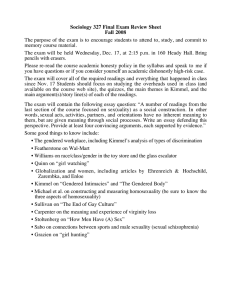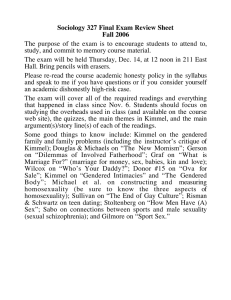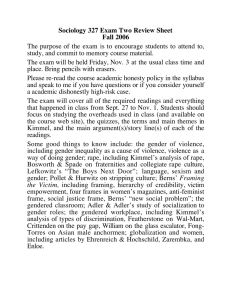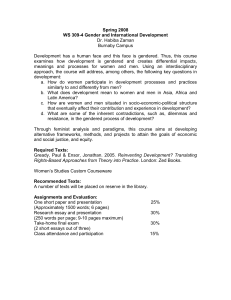I. ASCRC General Education Form Group Dept/Program Sociology/Women’s
advertisement
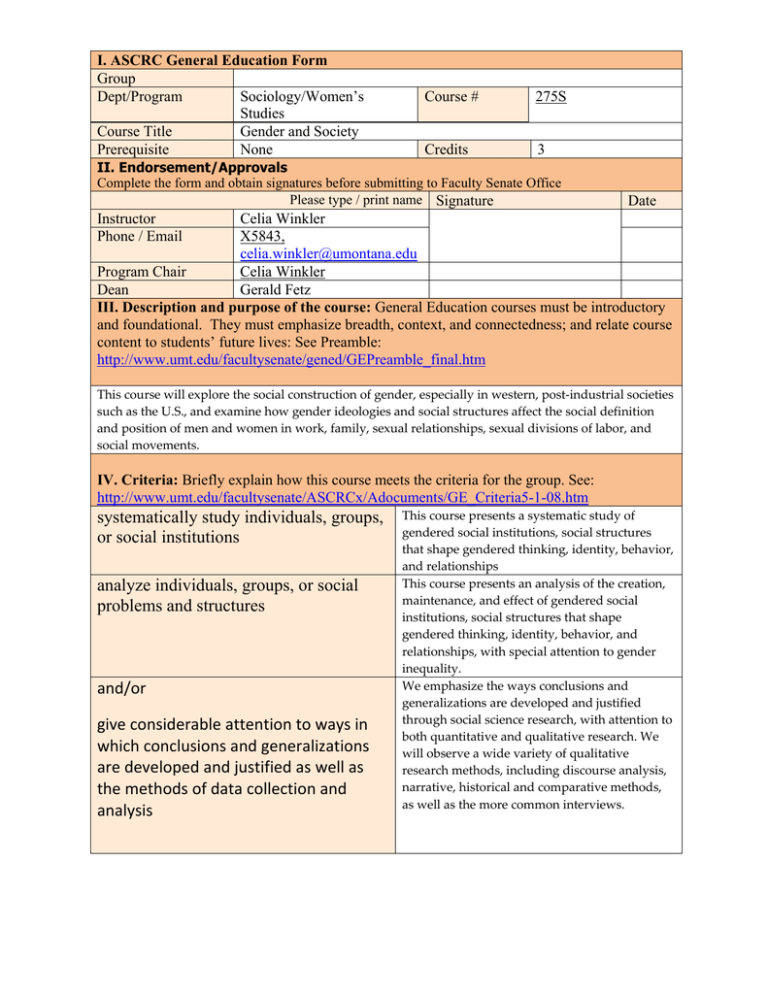
I. ASCRC General Education Form Group Dept/Program Sociology/Women’s Studies Course Title Gender and Society Prerequisite None Course # 275S Credits 3 II. Endorsement/Approvals Complete the form and obtain signatures before submitting to Faculty Senate Office Please type / print name Signature Date Instructor Phone / Email Celia Winkler X5843, celia.winkler@umontana.edu Program Chair Celia Winkler Dean Gerald Fetz III. Description and purpose of the course: General Education courses must be introductory and foundational. They must emphasize breadth, context, and connectedness; and relate course content to students’ future lives: See Preamble: http://www.umt.edu/facultysenate/gened/GEPreamble_final.htm This course will explore the social construction of gender, especially in western, post‐industrial societies such as the U.S., and examine how gender ideologies and social structures affect the social definition and position of men and women in work, family, sexual relationships, sexual divisions of labor, and social movements. IV. Criteria: Briefly explain how this course meets the criteria for the group. See: http://www.umt.edu/facultysenate/ASCRCx/Adocuments/GE_Criteria5-1-08.htm systematically study individuals, groups, or social institutions analyze individuals, groups, or social problems and structures and/or give considerable attention to ways in which conclusions and generalizations are developed and justified as well as the methods of data collection and analysis This course presents a systematic study of gendered social institutions, social structures that shape gendered thinking, identity, behavior, and relationships This course presents an analysis of the creation, maintenance, and effect of gendered social institutions, social structures that shape gendered thinking, identity, behavior, and relationships, with special attention to gender inequality. We emphasize the ways conclusions and generalizations are developed and justified through social science research, with attention to both quantitative and qualitative research. We will observe a wide variety of qualitative research methods, including discourse analysis, narrative, historical and comparative methods, as well as the more common interviews. V. Student Learning Goals: Briefly explain how this course will meet the applicable learning goals. See: http://www.umt.edu/facultysenate/ASCRCx/Adocuments/GE_Criteria5-1-08.htm Describe the nature, structure, and historical development of human behavior, organizations, social phenomena, and/or relationships use theory in explaining these individual, group, or social phenomena and/or understand, assess, and evaluate how conclusions and generalizations are justified based on data Describe the nature, structure and historical development of human behavior, organizations, and relationships by assisting students to understand Agender@ as a dynamic, socially constructed category rather than a fixed biological attribute Begin to comprehend the role of theory in explaining the construction and effect of gender on individuals, relationships, with attention to those that explain the variety of gendered social structures (which vary by class, race/ethnicity, sexuality, and other social phenomena) and the way they affect the lived experiences of men and women Understand, assess and evaluate how conclusions and generalizations are justified based on data by introducing and critiquing the various approaches sociologists use to understand patterns, reasons for, and changes in gendered social life. We will touch both quantitative and qualitative research methods, including discourse analysis, narrative, historical and comparative methods, as well as the more common interviews VII. Syllabus: Paste syllabus below or attach and send digital copy with form. ⇓ The syllabus should clearly describe how the above criteria are satisfied. For assistance on syllabus preparation see: http://teaching.berkeley.edu/bgd/syllabus.html See attached. *Please note: As an instructor of a general education course, you will be expected to provide sample assessment items and corresponding responses to the Assessment Advisory Committee. Gender & Society Prof. Celia Winkler, J.D., Ph.D. SS 323, 243‐5843 Sociology/WS 275S celia.winkler@umontana.edu T, Th time – time crn xxxx Office Hours: xxxxxxxxx and by appt. This course will explore the social construction of gender, especially in western, post‐industrial societies such as the U.S., and examine how gender ideologies and social structures affect the social definition and position of men and women in work, family, sexual relationships, sexual divisions of labor, and social movements. As a social science general education course, this course presents a systematic study and analysis of gendered social institutions, social structures that shape gendered thinking, identity, behavior, and relationships, with special attention to gender inequality, emphasizing the ways conclusions and generalizations are developed and justified through social science research. Goals Several interrelated goals are central to the course: 1) Describe the nature, structure and historical development of human behavior, organizations, and relationships by assisting students to understand Agender@ as a dynamic, socially constructed category rather than a fixed biological attribute; 2) Begin to comprehend the role of theory in explaining the construction and effect of gender on individuals, relationships, with attention to those that explain the variety of gendered social structures (which vary by class, race/ethnicity, sexuality, and other social phenomena) and the way they affect the lived experiences of men and women; and 3) Understand, assess and evaluate how conclusions and generalizations are justified based on data by introducing and critiquing the various approaches sociologists use to understand patterns, reasons for, and changes in gendered social life. This is a survey course, meaning that we will touch on many topics, but delve into none in any depth. It is hoped that something in this course will attract your interest, sparking your desire for further study and investigation. Please note that this course is cross‐listed with Sociology and Women=s Studies. Assessment Exams: There will be two midterms worth 30 points each, and a final exam worth 50 points, out of a total of 160 points: multiple choice, true/false, short answer. The final exam will be comprehensive. The exams will address all four goals, but will stress goal 1 (describing) and 4 (interpreting social science data). Reflection essays: There will be three reflection essays, each worth 10 points. The essays should be about 3 pages, double spaced. These essays will also assess the mastery of all four goals, but will stress goals two and three. Presentations: You will be required, in a small group or individually, to make a presentation on some topic involving social change, which presents both a “gender lens” or “feminist curiosity” perspective and a perspective which does not use either a “gender lens” or “feminist curiosity.” Please see me if a class presentation would cause undue hardship. The presentation will be graded by content (10 points) and group self‐evaluation (5 points). Participation and attendance (or lack thereof) will have an effect on your final grade. Good participation and attendance can increase a grade, while poor attendance may reduce a borderline grade. Points Due date Reflection essay 1 10 Thursday Week 3 Exam 1 30 Tuesday Week 5 Reflection essay 2 10 Tuesday Week 7 Exam 2 30 Tuesday Week 9 Reflection essay 3 10 Thursday Week 10 Attendance November 20 5 Presentation 15 TBA Final Exam 50 Total: 160 We will use the +/‐ system for grading, with the following as the breakdown for grades: 92‐100% A 88‐89.9% B+ 78‐79.9% C+ 68‐69.9% D+ < 60% F 90‐91.9% A‐ 82‐87.9% B 72‐77.9% C 62‐67.9% D 80‐81.9% B‐ 70‐71.9% C‐ 60‐61.9% D‐ Reading Lectures and discussions will assume that you have done the assigned reading. If you run short of time, at least please skim the materials so you have a rough familiarity with the contents. Kimmel, Michael. 2004. The Gendered Society. Second Edition. New York: Oxford University Press. Enloe, Cynthia. 2007. Globalization and Militarism: Feminists Make the Link. Lanham, MD: Rowman & Littlefield. Supplementary readings on ERES as announced. Housekeeping Disabilities: Please let me know if you have any sort of disability or language difficulties that would hinder your performance in exams or any of your other assignments. Office Hours: Please make generous use of office hours. We are here to talk about your grades, your thoughts, your plans for the future. Missed classes, late assignments: While you will not be penalized for missing the occasional class, failure to attend at least half of the classes will result in a loss of one letter grade. Active, thoughtful participation can increase your final grade. You must have prior permission (one day) to turn in a late assignment, or have a really, really good reason. Failing a really good reason or prior permission, your assignments will lose 10% for each day they are late. Furthermore, they will not be returned until the NEXT assignment is returned. In addition, if you are not in class when papers are returned (which is seldom the class after they are due), you will need to pick them up from the Teaching Assistant during her office hours. I cannot over‐emphasize how much this will put you at a disadvantage. You get behind in your work and you do not get feedback on ways you can improve your work in time for the next essay. Drop deadlines: September xx is the last day to drop by Cyberbear and October xx is the no‐questions‐ asked drop‐slip date. Incompletes: Please see the University Catalog for the University policy on incompletes. Plagiarism and other problems: Please see the Student Conduct Code in general and in particular the definition and potential consequences of plagiarism (the SCC=UM Homepage, A‐Z Index, click on S, scroll down to ʺStudent Conduct Codeʺ). It is expected that students will treat one another with respect. I will call upon the Dean of Students to assist with any student conduct problems. Gender and Society Soc/WS 275S Calendar ‐ Fall 20xx Reading Activity/Assignment Unit 1 ‐‐ Bodies and Images 1 Intro to course Shifting the Center Collins: “Matrix of Oppression” Lecture Kimmel: 1 Lecture Kimmel: 2 Lecture/Discuss reflection essays Kimmel: 3 Film: “Killing Us Softly III” Kimmel: 4 Film: “Tough Guise” Pt. 1 Kimmel: 5 Lecture/Discussion Kimmel: 10 Lecture/ Reflection Essay 1 Biology is Destiny? Sociobiological theories and their theoretical and empirical critiques Social Construction of Gender 2 Theories and empirical evidence for the social construction of gender; the media and body image; content analysis Thinking Gender 3 4 5 Theories and empirical evidence for a gendered sociology of knowledge; the media and social norms; content analysis Doing Gender Symbolic interaction Bodies Foucault Lecture/Review Exam 1 Unit 2 – Gendered Organizations 5 6 A Woman=s Place is in the ??? Review Kimmel 5 Film: ALife and Times of Rosie the Riveter@ Kimmel: 7 Lecture The Gendered Classroom Theories and research examining gendered education History of Gendered Work Kimmel: 8 Lecture Recommended: Acker* Lecture Gendered Intimacies & Friendships Narrative studies of intimacy and friendship Kimmel: 9 Discussion Gendered Families Kimmel: 6 (117‐ 132) Reflection Essay 2/Lecture Home/Work Interface Kimmel: 6 (132‐ 158) Lecture/Review Exam 2 Gendered wages 7 8 9 Theories and empirical evidence of wage inequality Unit III ‐‐ Gender/Politics/Power/Change 9 Film: TBA What is Feminism? Enloe: 1,2 Lecture Enloe: 3,4 Violence Kimmel: 11 Day of Dialogue TBA Women & Abu Ghraib Enloe: 5 Demilitarization Enloe: 6,7,8 Masculinities, Feminism, and Social Change Happy Thanksgiving! Gender & Change Presentations Presentations Presentations Discussion/Review 10 11 12 13 14 15 Final Exam:
